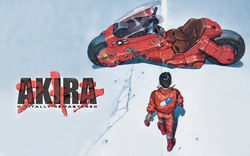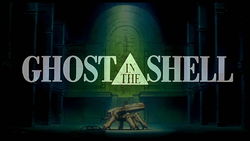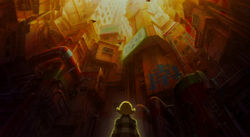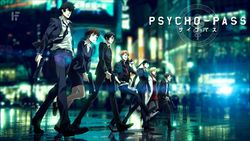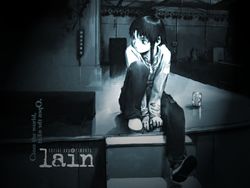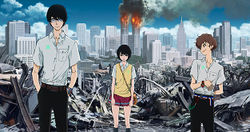We are still actively working on the spam issue.
Movies
This page provides a list of technology, science fiction, and cyberpunk-related movies, documentaries, anime and biographies.
Contents
Fiction
Anime
- Akira
- Akira is a 1988 Japanese animated science fiction action film directed by Katsuhiro Otomo. It was written by Otomo and Izo Hashimoto and based on Otomo's manga of the same name, focusing mainly on the first half of the story. The film depicts a dystopian version of Tokyo in the year 2019, with cyberpunk tones. The plot focuses on teenage biker Tetsuo Shima and his psychic powers, and the leader of his biker gang, Shotaro Kaneda. Several parties, including Kaneda, resistance terrorist Kei, Colonel Shikishima of the JSDF and a trio of espers, attempt to prevent Tetsuo from releasing the imprisoned psychic Akira. While most of the character designs and settings were adapted from the original manga, the restructured plot of the movie differs considerably from the print version, pruning much of the last half of the manga.
- The film has garnered a large following as a cult film since its theatrical release, and is widely considered to be a landmark in Japanese animation. It is considered by many critics to be one of the greatest animated and science fiction movies of all time.
- Cowboy Bebop
- Cowboy Bebop (カウボーイビバップ Kaubōi Bibappu) is a 1998 Japanese anime series animated by Sunrise featuring a production team led by director Shinichirō Watanabe, screenwriter Keiko Nobumoto, character designer Toshihiro Kawamoto, mechanical designer Kimitoshi Yamane, and composer Yoko Kanno. The twenty-six episodes ("sessions") of the series are set in the year 2071, and follow the lives of a bounty hunter crew traveling on the Bebop (their spaceship). Cowboy Bebop explores philosophical concepts including existentialism, existential ennui, and lonelines
- The series premiered in Japan on TV Tokyo from April 3 until June 26, 1998, broadcasting only twelve episodes and a special due to its controversial adult-themed content. The entire twenty-six episodes of the series were later broadcast on WOWOW from October 24 until April 24, 1999. The anime was adapted into two manga series which were serialized in Kadokawa Shoten's Asuka Fantasy DX. A film was later released to theaters worldwide.
- The anime series was dubbed in the English language by Animaze and ZRO Limit Productions, and was licensed by Bandai Entertainment in North America and is now licensed by Funimation. In Britain, it was licensed by Beez Entertainment and is now licensed by Anime Limited. Madman Entertainment has licensed it for releases in Australia and New Zealand. In 2001, Cowboy Bebop became the first anime title to be broadcast on Adult Swim in the United States.
- Cowboy Bebop became a critical and commercial success both in Japanese and international markets (most notably in the United States), garnered several major anime and science fiction awards upon its release, and received universal praise for its style, characters, story, voice acting, animation and soundtrack. In the years since its release, critics and reviewers, from the United States in particular, have hailed Cowboy Bebop as a masterpiece and frequently cite it as one of the greatest anime series of all time. Credited with helping to introduce anime to a new wave of Western viewers in the early 2000s, Cowboy Bebop has also been labelled a gateway series for the medium as a whole.
- Cowboy Bebop: The Movie
- Cowboy Bebop: The Movie, known in Japan as Cowboy Bebop: Knockin' on Heaven's Door (Japanese: カウボーイビバップ 天国の扉 Hepburn: Kaubōi Bibappu: Tengoku no Tobira), is a 2001 Japanese animated space Western action film based on the 1998 anime series Cowboy Bebop created by Hajime Yatate. Multiple staff from the original series worked on the film, including director Shinichirō Watanabe, writer Keiko Nobumoto, character designer Toshihiro Kawamoto, and animation director Hiroshi Osaka, and composer Yoko Kanno. The original English and Japanese voice cast also reprised their roles.
- Cowboy Bebop: The Movie is set between episodes 22 and 23 of the original series. The plot centers on a mysterious terrorist planning to destroy the human population on Mars using an unknown pathogen. The bounty hunter crew of the spaceship Bebop work to find the terrorist and discover the source of the pathogen before the attack can take place.
- The film was conceived by Watanabe as an extension of his work on the television series, which he treated as a series of miniature films. So as not to alienate fans of the series, a large amount of aesthetic material was incorporated, while also adjusting it to make it accessible to newcomers. Increased budget and production facilities enabled the use of filming styles associated with live-action films and a higher animation quality than the series. Arabic thematic elements were incorporated to contrast against the series, which entailed Watanabe traveling to Morocco for research. The Arabic atmosphere was also used in Kanno's music.
- The film was produced by studios Sunrise, which had previously developed the original series, Bones, a later studio founded by former Sunrise staff, and Bandai Visual. Cowboy Bebop: The Movie was released to theaters in Japan on September 1, 2001 and in the United States on August 11, 2002. It went on to gross over $3 million worldwide, and when released on DVD, it ranked high on Japanese and US charts. The film received generally positive reviews from mainstream and anime critics and was nominated for the Online Film Critics Society Award for Best Animated Film.
- Ghost in the Shell
- Ghost in the Shell, known in Japan as Mobile Armored Riot Police: Ghost In The Shell (攻殻機動隊 GHOST IN THE SHELL Kōkaku Kidōtai Gōsuto In Za Sheru?), is a 1995 anime science fiction film based on manga of the same title by Masamune Shirow. The film was written by Kazunori Itō, directed by Mamoru Oshii, animated by Production I.G, and starred the voices of Atsuko Tanaka, Akio Ōtsuka and Iemasa Kayumi.
- Ghost in the Shell follows the hunt of the public-security agency Section 9 for a mysterious hacker known as the Puppet Master. With the assistance of her team, Motoko Kusanagi tracks and finds their suspect, only to be drawn into a complex sequence of political intrigue and a cover-up as to the identity and goals of the Puppet Master.
- The overarching philosophical themes of the film include self-identity in a technologically-advanced world. The music, composed by Kenji Kawai, included an ancient Japanese language in a wedding song that serves as a key piece of music leading up to the climax of the movie. Widely considered one of the greatest anime films of all time, Ghost in the Shell received universal acclaim from critics, who praised its visuals, which at the time were the most effective synthesis of traditional cel animation and CG animation. It has served as inspiration for filmmakers such as The Wachowskis.
- In 2004, Oshii directed Innocence, billed as a separate work and not a true sequel to Ghost in the Shell. In 2008, Oshii released an updated version of the original film, titled Ghost in the Shell 2.0 that featured new audio and updated 3D computer graphics.
- Ghost in the Shell 2: Innocence
- Ghost in the Shell 2: Innocence, known in Japan as Mobile Armored Riot Police: Innocence (攻殻機動隊 イノセンス Kōkaku Kidōtai Inosensu?), is a 2004 anime/computer-animated sci-fi sequel to the 1995 film Ghost in the Shell. Released in Japan on March 6, 2004, and in the US on September 17, 2004, Innocence had a production budget of approximately $20 million (approx. 2 billion yen). To raise the sum, Production I.G studio's president, Mitsuhisa Ishikawa, asked Studio Ghibli's president, Toshio Suzuki, to co-produce.
- With a story loosely connected to the manga by Masamune Shirow, the film was written and directed by Ghost in the Shell director Mamoru Oshii. The film was honored best sci-fi film at the 2004 Nihon SF Taisho Awards and was in competition at the 2004 Cannes Film Festival. The soundtrack for the film was released under the name Innocence O.S.T. and a related novel called Innocence: After the Long Goodbye was released on February 29, 2004. This film makes many allusions and references to other famous works, such as The Future Eve. The foreign DVD release of the film faced many issues ranging from licensing to audio.
- Ghost in the Shell: Arise
- Ghost in the Shell: Arise (Japanese: 攻殻機動隊ARISE -GHOST IN THE SHELL- Hepburn: Kōkaku Kidōtai ARISE -GHOST IN THE SHELL-?) is an anime film and TV series that serves as a re-imagining of Masamune Shirow's Ghost in the Shell. The series features new character designs and is directed by Kazuchika Kise, screenplay by Tow Ubukata, and music by Cornelius.
- Ghost in the Shell: Arise - Alternative Architecture, a recompilation of the four original films in a television format, aired on nine stations from April 5 to June 14, 2015. The AAA broadcast included two original episodes that help tie Ghost in the Shell: Arise with its 2015 animated film sequel Ghost in the Shell: The New Movie.
- Ghost in the Shell: Stand Alone Complex
- Ghost in the Shell: Stand Alone Complex (攻殻機動隊 STAND ALONE COMPLEX Kōkaku Kidōtai STAND ALONE COMPLEX?) is an anime television series produced by Production I.G and based on Masamune Shirow's manga Ghost in the Shell. It was written and directed by Kenji Kamiyama, with original character design by Hajime Shimomura and a soundtrack by Yoko Kanno. The first season aired on SKY PerfecTV!'s Perfect Choice from October 2002 to October 2003 and was positively received by critics. A second season titled Ghost in the Shell: S.A.C. 2nd GIG (攻殻機動隊 S.A.C. 2nd GIG Kōkaku Kidōtai S.A.C. 2nd GIG?) aired on Animax from 1 January 2004 to 8 January 2005.
- The series centers on the members of an elite cybernetic law enforcement unit known as Public Security Section 9 as they investigate cyber-crime and terrorism cases; these cases often are connected to their pursuit of an elite "Super Class A" hacker and corporate terrorist known as "The Laughing Man." A series of associated short comic animations, titled Tachikomatic Days, aired after each episode. These shorts star the Tachikoma "think-tanks" from the main series, and they typically relate directly to the story of the preceding Stand Alone Complex episode.
- The first season was also adapted into a feature-length OVA titled The Laughing Man, which was released in 2005 and two manga series in 2009. The series had also received video game spin-offs for the PS2, PSP, and mobile phones. 2nd GIG was also later adapted into a feature-length OVA entitled Individual Eleven, which was released in 2006; Solid State Society, a TV-film sequel to the Stand Alone Complex series, was also released in that year.
- Metropolis
- Metropolis (メトロポリス Metoroporisu?) is a 2001 anime film loosely based on the 1949 Metropolis manga created by Osamu Tezuka, itself inspired by the 1927 German silent film of the same name, though the two do not share plot elements. The anime, however, does draw aspects of its storyline directly from the 1927 film. The anime had an all-star production team, including renowned anime director Rintaro, Akira creator Katsuhiro Otomo as script writer, and animation by Madhouse with conceptual support from Tezuka Productions.
- Interstella 5555: The 5tory of the 5ecret 5tar 5ystem
- Interstella 5555: The 5tory of the 5ecret 5tar 5ystem (インターステラ5555 Intāsutera Fō Faibu, "Four Five") was Daft Punk's first major, and most famous music video work. The entire movie is a French/Japanese animated Anime story of a interstellar pop band's abduction and their eventual rescue. While there is no dialog, and minimal sound effects, it is filled with the music of Daft Punk much in the same way that the movie Pink Floyd's The Wall is done. It incorporates futurism, science fiction, and has cyberpunk overtones.
- Psycho Pass
- Psycho-Pass (Japanese: サイコパス Hepburn: Saiko Pasu?) (stylized as PSYCHO-PASS) is a anime television series that was produced by Production I.G, directed by Naoyoshi Shiotani & Katsuyuki Motohiro and written by Gen Urobuchi. The series was aired on Fuji TV's Noitamina programming block between October 2012 and March 2013. The story takes place in an authoritarian future dystopia, where omnipresent public sensors continuously scan the Psycho-Pass of every citizen in range. The sensors measure mental state, personality, and the probability that the citizen will commit crimes, alerting authorities when someone exceeds accepted norms. To enforce order, the officers of the Public Safety Bureau carry hand weapons called Dominators. The story follows Akane Tsunemori, Shinya Kogami, and other members of Unit One of the Public Safety Bureau's Criminal Investigation Division, and the crimes they investigate using Dominators.
- Psycho-Pass originated from Production I.G.'s interest in making a successor to Mamoru Oshii's achievements. The series was inspired by several live-action films. Chief director Katsuyuki Motohiro aimed to explore psychological themes in society's youth using dystopian storylines. Several rules were used to focus on making the dystopia that the characters live in.
- The series was licensed by Funimation in North America. A second season began airing in October 2014, with an animated film released in January 2015. A manga adaptation has been in serialization in Shueisha's Jump Square magazine and several novels, including an adaptation and prequels to the original story, have been published. An episodic video game adaptation called Chimi Chara Psycho-Pass was developed by Nitroplus Staffers in collaboration with Production I.G. New novels and another manga were serialized in 2014.
- Serial Experiment Lain
- Serial Experiments Lain (シリアルエクスペリメンツレイン Shiriaru Ekusuperimentsu Rein?) is an avant-garde anime series directed by Ryutaro Nakamura, with character design by Yoshitoshi ABe, screenplay written by Chiaki J. Konaka, and produced by Yasuyuki Ueda for Triangle Staff. It was broadcast on TV Tokyo from July to September 1998. The series is influenced by themes such as reality, identity, and communication, and it demonstrates them by using philosophy, computer history, cyberpunk literature, and conspiracy theory.
- Terror in Resonance
- Terror in Resonance (残響のテロル Zankyō no Teroru?, lit. "Terror of the Echo") , also known as Terror in Tokyo in Japan, is a Japanese anime television series produced by MAPPA. The anime was directed by Shinichirō Watanabe, with character designs by Kazuto Nakazawa and music by Yoko Kanno. The anime began airing on Fuji TV's Noitamina block on July 10, 2014 and its final episode aired on September 25, 2014. In total, it was made up of 11 episodes. Funimation has acquired North American streaming rights and plans to release an English dub on DVD on January 19th, 2016, while Anime Limited has acquired streaming rights for the UK and Madman Entertainment has acquired rights in Australia. Funimation premiered the series at Anime Expo on July 5, 2014.
- Summer Wars
- Summer Wars (Japanese: サマーウォーズ Hepburn: Samā Wōzu?) is a 2009 Japanese animated science fiction film directed by Mamoru Hosoda, animated by Madhouse and distributed by Warner Bros. Pictures. The film's voice cast includes Ryunosuke Kamiki, Nanami Sakuraba, Mitsuki Tanimura, Sumiko Fuji and Ayumu Saitō. The film tells the story of Kenji Koiso, a timid eleventh-grade math genius who is taken to Ueda by twelfth-grade student Natsuki Shinohara to celebrate her great-grandmother's 90th birthday. However, he is falsely implicated in the hacking of a virtual world by a sadistic artificial intelligence named Love Machine. Kenji must repair the damage done to it and find a way to stop the rogue computer program from causing any further damage.
- After producing The Girl Who Leapt Through Time, Madhouse was asked to produce something new. Hosoda and writer Satoko Okudera conceived a story about a social network and a stranger's connection with a family. The real-life city of Ueda was chosen as the setting for Summer Wars, as part of the territory was once governed by the Sanada clan and was close to Hosoda's birthplace in Toyama. Hosoda used the clan as the basis for the Jinnouchi family after visiting his then-fiancé's home in Ueda.
- Production of Summer Wars commenced in 2006. Art director Youji Takeshige incorporated Japanese houses into his background designs. Hosoda also insisted that 80 family members were to be included as main characters. The project was first announced at the 2008 Tokyo International Anime Fair and the first trailer of the film was released in April 2009. Audience interest was fueled primarily through word of mouth and Internet publicity. A manga adaptation of the film was written by Iqura Sugimoto and began its serialization in July 2009.
- Summer Wars premiered in Japan on August 1, 2009. It grossed over US$1 million in its opening weekend in 127 theaters and ranked No. 7 at the box office. The film was well received by critics and the general audience and was financially successful, earning $18 million worldwide. It won several awards such as the 2010 Japan Academy Prize for Animation of the Year, the 2010 Japan Media Arts Festival's Animation Division Grand Prize, the Anaheim International Film Festival's Audience Award for Best Animated Feature and was nominated for the 2009 Golden Leopard award at the Locarno International Film Festival.
- Himouto! Umaru-chan
- The series follows Umaru Doma, a high school girl who lives with her older brother Taihei. At school, Umaru appears to be the ideal student with good looks, top grades, and a lot of talent. Once she gets home, however, she reverts into a layabout who spends her time lying around, playing video games, and constantly depending on her older brother, much to his dismay. Over the course of the series, Umaru's alternative personalities help her become friends with her female classmates Kirie Motoba, who has a reputation of glaring at people; and Sylphynford Tachibana, her competitive school rival; both of whom turn out to be little sisters of Taihei's coworkers.
Biography
- Pirates of Silicon Valley (1999)
- Probably the best movie about the Microsoft vs. Apple war and the tech boom in the 80s-90s. Plus it's pretty fucking entertaining.
- Also the worst direct-to-video movie about tech ever.
- The Social Network (2010)
- Largely fabricated history of facebook. Great movie, but definitely not a doco.
- The Fifth Estate (2013)
- Story of WikiLeaks and Assange through the filter of Hollywood. Pretty bland.
- Jobs (2013)
- Written by a man with only one imdb credit, no wikipedia article and no web presence (who is probably an Alan Smithee), Ashton Kutcher plays Ashton Kutcher: Steve Jobs Man. Did you know that Steve Jobs was a visionary and could also be a bit of a jerk? Then you've seen this movie already.
Crime/Drama/Thriller
- WarGames (1983)
- This movie convinced Ronald Reagan to make law against this movie happening. The movie is a work of fiction, however, and sadly the law still applies. It makes little sense.
- Stars Ferris Beuller and the goth girl from The Breakfast Club. Kid hacks into nuclear war and plays against an AI.
- Sneakers (1992)
- Heist movie with a cryptographic maguffin. Well worth it.
- Hackers (1995)
- Classic tech nerd movie and the source of many, many references. Stars Sick Boy from Trainspotting as a magic hacker, Angelina Jolie (pre facial reconstruction) as the antagonist, and a she-he and rollerblades. Required viewing.
- The Net (1995)
- If you're an FSFfag, this movie shows the dangers of non-free software :^)
- Sandra Bullock learns what smileys are. Cringey but classic.
- 23 (1998)
- Track Down aka Takedown (2000)
- Entertaining but innacurate movie about the hunt for Mitnick.
- Swordfish (2001)
- John Travolta plays a wonderful crime boss who forces this computer hacker to hack into bank accounts and stuff. P great.
- Untraceable (2008)
- Techsploitation movie to scare your parents.
Comedy
- Weird Science (1985)
- Two young men attempt to make a beautiful, sex crazed woman out of their computer, a doll, a modem, illegal government software, and electricity. It goes horribly right!
- iSteve (2013)
- The first biopic that came out after Steve Job's death, this movie is a hilarious production from the website Funny or Die. This is also their first Feature-Length production!
Pornographic
- HaXXXor: Volume 1: No Longer Floppy (2003)
- Girls remove clothing and masturbate while providing brief tutorials on topics such as network sniffing and dumpster diving.
- HaXXXor Volume 2: Fear of an 8-bit Planet (2004)
- More girls remove clothing and masturbate while providing brief tutorials on topics such as counting in binary and p2p filesharing.
Romance
- Her (2013)
- Joaquin Pheonix has a moustache in the near future and falls in love with an AI lady voiced by Scarlett Johansson. The AI improves upon itself but can it still love his moustache? (Actually a really good movie).
Sci-Fi + Action/Adventure/Drama
- 2001: A Space Odyssey (1968)
- This is a Kubrick movie, so you know it'll be good.
- (So long as you enjoy slow 1960s space stuff and don't mind 20+ minutes of acid trip "artful"/"deep"/"shit" ending.) (Still required viewing).
- Colossus: The Forbin Project (1970)
- America creates a massive computer network AI to control the nuclear arsenal. Russia creates the same AI with stolen plans. The two computers connect, gain sentience, share a mind, and take over the world.
- Blade Runner (1982)
- One of the earliest Cyberpunk movies.
- Harrison Ford hunts down some rogue cyborgs who question their questionable programming. Must see.
- TRON (1982)
- This movie is almost a romanticized view of the connection between programmer and program.
- 2010: The Year we Made Contact (1984)
- The sequel to 2001: A Space Oddesy, but not a Kubrick production. "My God. It's full of Stars!"
- The Terminator (1984)
- The Governator at his best.
- A cyborg is sent back in time to kill the mother of the leader of the Human Resistance. A human soldier is also sent back in time to protect the mother.
- Short Circuit (1986)
- "Number 5 is... Alive!"
- An AI robot breaks his programming and acts as comedy relief.
- Max Headroom: 20 Minutes into the Future (1986)
- Excellent cyberpunk movie. TV show version was bad though.
- The Lawnmower Man (1992)
- Pierce Brosnan is a professor who makes a retard super smart via 1990s VR tech. No-Longer-Retard guy creates cybergeddon.
- eXistenZ (1999)
- Jennifer Jason Leigh is a l337 games programmer for games beyond VR that connect directly into your spine. Layers upon layers of reality ensue.
- The Matrix (1999)
- First one was pretty good. Second one was... less good. Third one was...
- A random anon breaks out of virtual reality (our reality) and learns how to hack it and disrupt our robot overlords. Stars Keanu Reaves in "Not Bill and Ted so I'm a plank of wood" mode, yet isn't bad. Required viewing.
- The Thirteenth Floor (1999)
- The creator of a matrixesque 1930s simulator is murdered and his programmer employee enters the simulation to investigate. Starts off pretty slow but picks up at the end.
- Primer (2004)
- Super Geniuses talk shop for approximately fourteen hours without a single reference for the audience to connect to.
- I Robot (2004)
- Will Smith in the year 2030, robots become commonplace and slaves to humans.
- Iron Man (2008)
- "I am Iron Man! Has he lost his mind? Can he see or is he blind? Who the fuck care's he's Iron Man!"
- TRON: Legacy (2010)
- Remake of the other TRON.
- Transcendence (2014)
- One of the worst movies ever made. Johnny Depp plays Johnny Depp: Quiet Computer Man, whose brain is uploaded to become an AI which improves upon itself to become omnipotent. Then nothing happens. Far, far shallower than an old Star Trek episode, far, far less exciting than 90s vr schlock. About half the runtime is establishing shots.
Non-fiction
Documentary
- The KGB, the Computer and Me (1990)
- Follows an eccentric astronomer trying to track down a hacker in the late 80s. Low budget, but good fun.
- The Triumph of the Nerds (1996)
- Very dated doco by a 1990s computer nerd about the rise of computers.
- Code Rush (2000)
- Freedom Downtime (2001)
- Doco about Kevin Mitnick's life and incarceration. Features plenty of hacker royalty.
- The Code (2001)
- Revolution OS (2001)
- Stallman, Linus, etc.
- In the Realm of the Hackers (2003)
- Follows the late 80s hacker scene in Melbourne, Australia, training grounds of Julian "Mendax" Assange.
- Once Upon Atari (2003)
- History of Atari told by original Atari devs. If you don't know, they were all crazy dudes on drugs and awesome as fuck.
- Tetris: From Russia With Love (2004)
- Follows the creation of Tetris in communist Russia and the shitfight to import it into America/Europe.
- BBS: The Documentary (2005)
- History of BBS boards (pre internet computer networks) which covers a surprising amount of modern day problems with fuckwits ruining the internet.
- Tilt, The Battle to Save Pinball (2006)
- Great history of pinball machines from mechanical to mech/rom and even into 3d video bullshit. If you like pinball, you must watch this.
- The King of Kong: A Fistful of Quarters (2007)
- Follows oldschool arcade game champions who hold alltime highscores. Some drama with Billy Mitchell (champion who had commercial success) vs Steve Wiebe (loveable underdog). Drama is a bit forced, but still a great doco if you're a MAME head.
- Good Copy Bad Copy (2007)
- Doco about copyright law. Has interesting parts about piracy culture in Brazil and Nigeria. Still pretty dry.
- RiP!: A Remix Manifesto (2008)
- Doco discussion about the right to remix existing media. Not bad, but if you're on this wiki you are probably already across the issues about copyright in 2008.
- Hackers Wanted (2009)
- Fairly balanced doco about hackers and crime/terrorism. Focuses on Adrian Lamo, who went on to snitch on Chelsea (formerly Bradley) Manning.
- Get Lamp (2010)
- A history of Text Adventures from the physical cave system that inspired Adventure to modern Interactive Fiction.
- Ecstacy of Order: The Tetris Masters (2011)
- Doco about the elite players of Tetris. Revolves around a big tournament to determine the ultimate Tetris master. Required viewing if you like Tetris.
- The Space Invaders - In Search of Lost Time (2012)
- Doco about neckbeards who hoard original arcade machines/arcade owners. Well worth it if you own/wish to own an arcade cabinet.
- DEFCON: The Documentary (2013)
- The history and experience of DEFCON. Can be found for free on the DEFCON site
- Terms and Conditions May Apply (2013)
- Doco about copyright problems. Decent, but pretty dull.
- TPB AFK: The Pirate Bay Away from Keyboard (2013)
- Doco about the original Pirate Bay, featuring Gottfrid "anakata" Svartholm, Peter Sunde and Fredrik Neij. Follows the copy movement, pirate bay raids, legal troubles and some juicy shots of TPB servers. Well worth it.
- We Steal Secrets: The Story of WikiLeaks (2013)
- About the inception of WikiLeaks and ensuing media shitstorm. More sympathetic to Manning than Assange, but not the worst criticism made of WikiLeaks. Focuses less on the impact of the leaks and more on people behind them. The title is a quote from the ex NSA/CIA director.
- The Internet's Own Boy: The Story of Aaron Swartz (2014)
- All about Aaron Schwartz's long fight with Copyright law, and his suicide before trial
- Citizenfour (2014)
- Laura Poitras' doco on Snowden. Lots of Snowden time. Lots of footage from when the shit was hitting the fan. Required viewing unless you're just some anime faggot.
- Digital Amnesia (2014)
- Short doco on ArchiveTeam who are similar to the Internet Archive Project (archive.org). Philosophy and technical challenges of recording our internet.
- Atari Game Over (2014)
- Brief history of Atari and the video game crash. Focuses on digging up E.T. Cartridges in the famous landfill (they find them, and more).
See also
- /g/ related Music
- /g/ related Video Games
